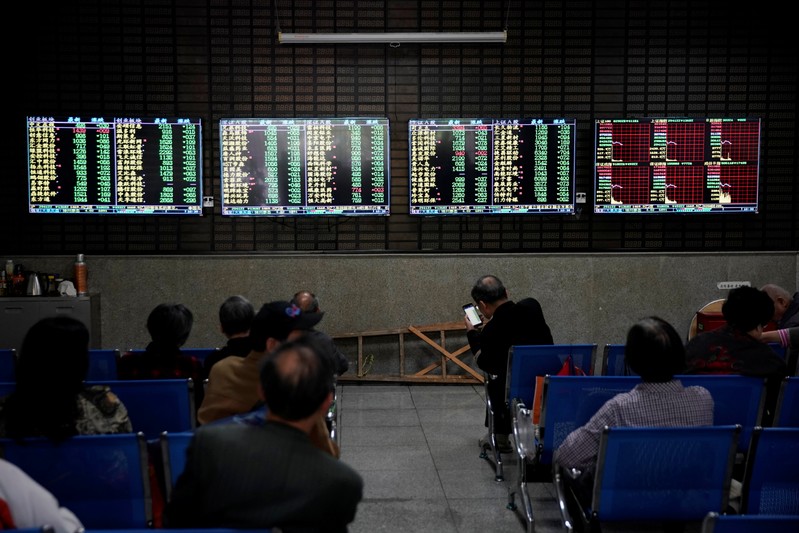
FILE PHOTO: Investors look at screens showing stock information at a brokerage house in Shanghai, China May 6, 2019. REUTERS/Aly Song
May 10, 2019
By Andrew Galbraith and Noah Sin
SHANGHAI/HONG KONG (Reuters) – Chinese shares and the yuan strengthened on Friday after the U.S. imposed higher tariffs on imports of $200 billion worth of Chinese goods and China vowed retaliation, as domestic investors looked to continuing Sino-U.S. trade talks for signs of hope.
U.S. President Donald Trump’s tariff increase to 25% on $200 billion worth of Chinese goods took effect on Friday during the midday break for China’s stock market. China’s Commerce Ministry said it “deeply regrets” the U.S. decision, adding that it would take necessary countermeasures, without elaborating.
But after talking for 90 minutes on Thursday in Washington, Chinese Vice Premier Liu He, U.S. Trade Representative Robert Lighthizer and U.S. Treasury Secretary Steven Mnuchin were expected to resume negotiations on Friday.
China’s benchmark Shanghai Composite index and blue-chip CSI300 index dipped briefly into the red as trading resumed for the afternoon, but quickly reversed course.
The Shanghai Composite was last up 2%, and the CSI300 gained 2.4%.
“All the negative news is out there, and uncertainty is eliminated,” said Zhang Yanbin, an analyst at Zheshang Securities. He added that sharp falls in Chinese shares in recent days limited the room for further sharp drops.
Both the Shanghai Composite and the CSI300 had ended at 11-week lows on Thursday.
“The future is bright, as Vice Premier Liu He’s comments in Washington might indicate relatively high chances for reaching an agreement,” said Zhu Junchun, an analyst with Lianxun Securities.
“The recent setback in the talks might be a result of tactics, but would not impact their ultimate direction and result,” he said.
In Hong Kong, the Hang Seng Index was up 0.8% while H-shares added 1%.
The smaller Shenzhen index was up 2.4% and the start-up board ChiNext Composite index was higher by 3%.
“Market sentiment has improved following the progress of the latest round of Sino-U.S. trade talks, leading to a rebound from recent falls,” said Zhou Liang, founder of Shanghai Minority Investment Management. “Although facing an escalating trade war, the market has been much stronger this year than last, reflecting the improved confidence of Chinese investors.”
China’s yuan was 0.3% stronger at 6.8071 per dollar, despite China’s central bank setting the midpoint of the currency’s daily trading band at its weakest level in 3-1/2 months before the market open, at 6.7912 per dollar.
The soft fix came after a tariff war-inspired sell-off in the spot market on Thursday, although traders had expected it to come in even lower.
The offshore yuan strengthened in early trade, but later gave up most of its gains. It was last a touch stronger, trading at 6.8375 per dollar. It had weakened to a low of 6.8636 per dollar on Thursday.
Zhou Hao, senior EM economist at Commerzbank in Singapore said rises in the yuan were largely triggered by changes in the market sentiment.
“Trump is very fickle-minded. And investor sentiment had switched from overly optimistic to overly pessimistic,” he said.
Zhou said that investors now felt that “as long as trade negotiations continue it’s a good thing.”
Zhou said he did not think the rebound would be sustainable, and expects the yuan to trade in a range of 6.75 to 6.9 per dollar.
Chinese government bond futures were unmoved, with 10-year treasury futures for June delivery, the most-traded contract, trading up 0.04% at 97.030.
(Reporting by Andrew Galbraith and Noah Sin; Additional reporting by Luoyan Liu, Samuel Shen and Winni Zhou; Editing by Sam Holmes & Simon Cameron-Moore)

